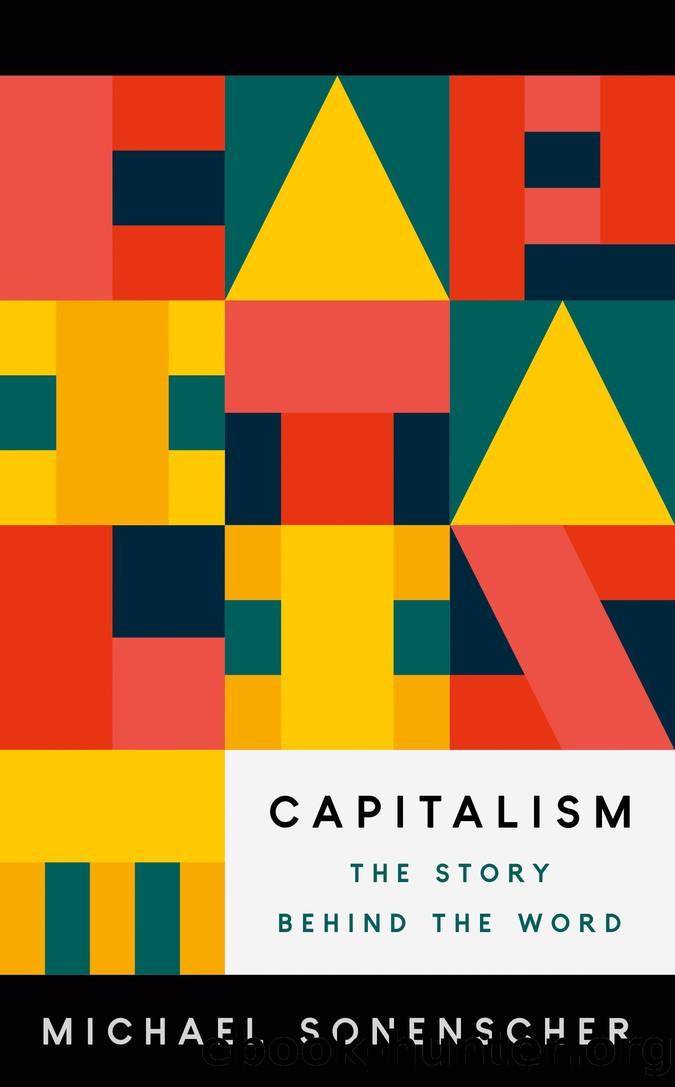Capitalism by Michael Sonenscher;

Author:Michael Sonenscher; [Sonenscher;, Michael]
Language: eng
Format: epub
ISBN: 9780691237206
Publisher: Princeton UP
Published: 2022-07-08T00:00:00+00:00
The same quality belonged to the law, a subject that Hegel discussed alongside the subject of money in the same lemma. It was universal because it was rational, and this rationality meant, almost by definition, that a law was something less than a pure command (like âThou shalt not killâ), but also something more than a purely factual description because it could also entail a permission or prohibition.6 Its relationship to a state meant that the law was also more general than a command but was still less particular than a fact. Together, the combination of money and the law added up to both a fiscal state and a Rechtsstaat.
Civil society generated wealth, but civil society could also generate conflict. Conflict called for states, laws, and government. But states, laws, and government called for taxing and spending as well as regulating and ruling. Hegelâs insight was to see that the position of the universal estate lying somewhere between the organisations and institutions of civil society and the organisations and institutions of the state meant that credit would be built into the evolving relationship between the regulating and ruling parts and the taxing and spending parts of the whole system. Since the universal estate had no resources of its own, leads and lags of income and expenditure would be entrenched within the whole administrative system, with the result that these credit-based leads and lags would mean that the state depended on civil society for its resources as strongly and deeply as civil society depended on the state for its security. The result, for the whole system, would be an embryonic capacity to measure, calculate, and project the allocation and distribution of resources within both civil society and the state and, because of the interrelationship of credit, interest rates, and the availability of capital, a further embryonic capacity for government to have a real economic policy. By identifying a third, administrative, term lying between the state and the market, Hegel began to identify the real dimensions of what was involved in creating a framework for thinking about politics in commercial society. Administration could be combined with public accountancy and public accountability, but it also gave rise to the problematic subject of administrative law, which was neither quite private nor quite public and, because of this, supplied many opportunities for the development of something analogous to the English Common Law with its emphasis on cases, precedents, and judicial interpretation.
The framework that Hegel began to establish also relied on two of the more obvious features of the division of labour, namely, its specialisation and differentiation. These features of the division of labour could be transferred readily to the idea of the separation of powers because specialisation and differentiation could be built as easily and cumulatively into an administration as into many other types of commercial, financial, or industrial organisation. On this basis, the old distinctions separating the legislative, executive, and judicial powers could be reinforced or modified by a potentially endless array of variations
Download
This site does not store any files on its server. We only index and link to content provided by other sites. Please contact the content providers to delete copyright contents if any and email us, we'll remove relevant links or contents immediately.
International Integration of the Brazilian Economy by Elias C. Grivoyannis(74814)
The Radium Girls by Kate Moore(11621)
Turbulence by E. J. Noyes(7700)
Nudge - Improving Decisions about Health, Wealth, and Happiness by Thaler Sunstein(7242)
The Black Swan by Nassim Nicholas Taleb(6764)
Rich Dad Poor Dad by Robert T. Kiyosaki(6175)
Pioneering Portfolio Management by David F. Swensen(6079)
Man-made Catastrophes and Risk Information Concealment by Dmitry Chernov & Didier Sornette(5647)
Zero to One by Peter Thiel(5488)
Secrecy World by Jake Bernstein(4388)
Millionaire: The Philanderer, Gambler, and Duelist Who Invented Modern Finance by Janet Gleeson(4094)
The Age of Surveillance Capitalism by Shoshana Zuboff(3985)
Skin in the Game by Nassim Nicholas Taleb(3965)
The Money Culture by Michael Lewis(3846)
Bullshit Jobs by David Graeber(3830)
Skin in the Game: Hidden Asymmetries in Daily Life by Nassim Nicholas Taleb(3723)
The Dhandho Investor by Mohnish Pabrai(3560)
The Wisdom of Finance by Mihir Desai(3523)
Blockchain Basics by Daniel Drescher(3329)
